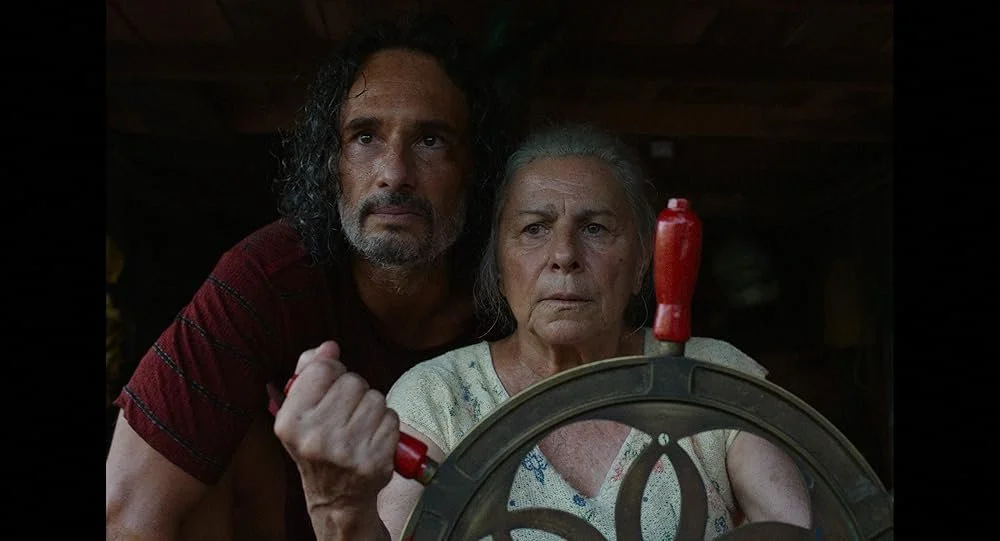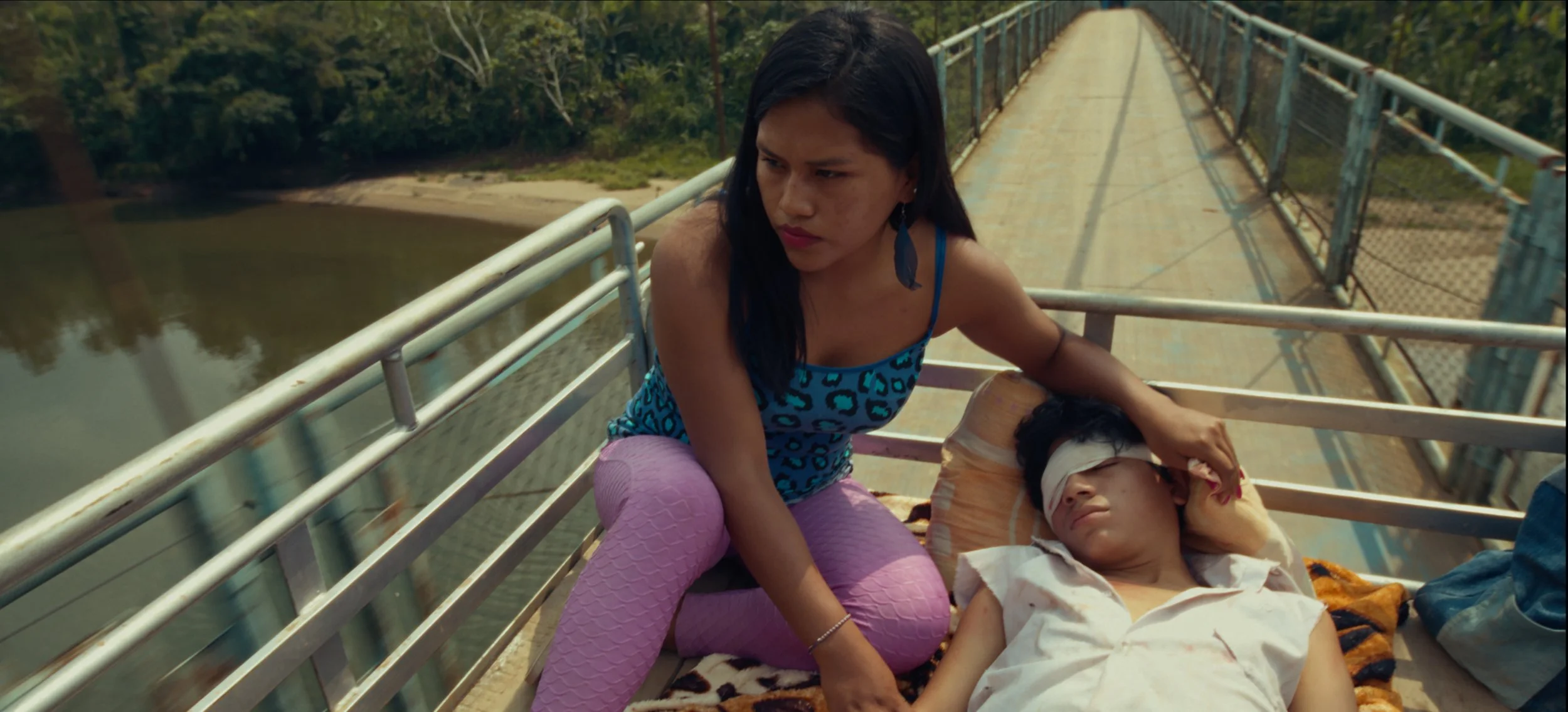The Berlin Film Festival has unveiled the complete lineup for its 75th edition, which includes numerous Latin American selections, among them the world premieres of three films by Latin American directors in the Golden Bear main competition: Dreams by Mexican director Michel Franco; The Message / El mensaje by Argentine director Iván Fund; and The Blue Trail / O Último Azul by Gabriel Mascaro.
Franco pairs again with American actress Jessica Chastain—following their collaboration on Memory in 2023—in Dreams, which tells the story of Fernando, a young ballet dancer from Mexico who crosses the border to pursue his dreams in San Francisco, believing his lover will support him. As ambition and love clash with harsh realities, he must face the true nature of their relationship. Mexican ballet dancer, actor, and guest artist of the American Ballet Theatre, Isaac Hernández, stars as Fernando.
Starring Mara Bestelli, Marcelo Subiotto, Anika Bootz, and Betania Cappato, and set in the Argentine countryside, Iván Fund’s The Message follows a child with a special gift whose opportunistic guardians devise a plan to offer consultations with an animal medium to make a living.
The latest film by Mascaro, starring Denise Weinberg, Rodrigo Santoro, Miriam Socorrás, and Adanilo, is set in the near future, where the elderly must relocate to remote retirement colonies so that the younger generations can go about their work undisturbed. The 77-year-old Tereza refuses and instead embarks on a life-changing journey through the Amazon.
The Berlinale will also host the world premiere of Argentine director Lucio Castro’s second feature film, After This Death, as a Special Gala. Starring Mia Maestro, Lee Pace, Rupert Friend, Gwendoline Christie, and Philip Ettinger, the film follows a woman whose affair with an enigmatic underground musician throws her life into chaos when he disappears. As she fends off his obsessive fans, she must also confront her fractured marriage and reclaim her identity and future.
The Brazilian director Anna Muylaert (The Second Mother) returns to the Berlinale Special section with her latest film, The Best Mother in the World / A melhor mãe do mundo. Starring Shirley Cruz, Seu Jorge, Rihanna Barbosa, and BeninAyo, the film tells the story of Gal, who escapes an abusive relationship by putting her two young children into the recycling cart she uses to collect trash on the city streets and running away. Alone and facing the perils of homelessness, she convinces her children that they are on an adventure.
The new competitive section Perspectives, dedicated entirely to first and second feature films, will host the world premiere of the Mexican film The Devil Smokes (and Saves the Burnt Matches in the Same Box) / El diablo fuma (y guarda las cabezas de los cerillos quemados en la misma caja), the debut feature by Ernesto Martínez Bucio, and the international premiere of Mad Bills to Pay (or Destiny, dile que no soy malo), the debut feature by Dominican-American director Joel Alfonso Vargas.
In The Devil Smokes, the fears of five stoic young siblings, abandoned by their parents, intertwine with those of their schizophrenic grandmother, who now cares for them. The lines between reality and imagination blur and gradually dissolve. In Mad Bills to Pay, Rico’s summer is a whirlwind of chasing girls and selling homemade cocktails out of a cool box on Orchard Beach in the Bronx. However, his carefree days come to an abrupt end when circumstances force his teenage girlfriend, Destiny, to move in with his family.
Brazilian filmmaking duo Márcio Reolon and Filipe Matzembacher, who premiered their directorial debut Seashore / Beira-Mar at the 2015 Berlinale, will screen their latest film, Night Stage / Ato Noturno, for its world premiere in the Panorama section. The story follows an actor and a politician who start a secret affair and together discover their fetish for having sex in public places. The closer they reach their dream of fame, the more they feel the urge to put themselves at risk.
The Panorama section will also feature the international premiere of Magic Farm, an Argentina-USA co-production directed by Amalia Ulman. The film follows an American film crew working for an edgy media company traveling to Argentina to cover a musician who has the potential to go viral. When they realize they have landed in the wrong country, they decide to hire locals to fabricate a trend.
Olmo, a US-Mexico co-production directed by Fernando Eimbcke, follows a fourteen-year-old who must care for his bedridden father with multiple sclerosis. When his neighbor, Nina Sandoval, invites him to a party, his world is turned upside down.
Within the documentary section of Panorama, Paraguayan filmmaker Juanjo Pereira presents his debut film, Under the Flags, the Sun / Bajo las banderas, el sol, a fully archival journey through the 35 years of Alfredo Stroessner’s regime in Paraguay, revealing unseen footage and exploring one of the longest-running dictatorships in history, whose effects still resonate today.
The Forum and Forum Expanded programs reflect on the medium of film, socio-artistic discourse, and aesthetics, featuring seven Latin American productions. After Dreaming by Christine Haroutounian, a US, Armenian, and Mexican co-production, presents a hallucinatory odyssey through the mythologies of a nation in perpetual war. Letters from Absurd / Cartas do Absurdo by Brazilian filmmaker Gabraz Sanna addresses five centuries of genocide against Brazil’s Indigenous peoples through four 17th-century letters written by native Brazilians.
Punku by Juan Daniel Fernández Molero offers a haunting exploration of Peru’s cultural contradictions, blending analogue and digital formats. The Dominican feature Colosal by Nayibe Tavares-Abel uses genealogy, archival material, and uncomfortable questions to reveal political truths about the director’s family and the Dominican Republic. Iracema / Iracema, uma transa amazônica by Jorge Bodanzky and Orlando Senna, a Brazilian classic, portrays a young Indigenous woman’s journey to the city, exposing the destructive forces of extractivist capitalism even 50 years ago.
Also screening are The Memory of Butterflies / La memoria de las mariposas by Peruvian filmmaker Tatiana Fuentes Sadowski, a cinematic monument to the Indigenous victims of Peru’s rubber trade; and Zizi (or Praying to a Fabulous Tree) / Zizi ou oração da jaca fabulosa by Brazilian director Felipe M. Bragança blending documentary and staged scenes to tell an intimate family story in Rio’s suburbs.
In the Generation Kplus and Generation 14plus competition programs, six films spotlight Latin America’s fresh perspectives. Barbed Wire / Arame farpado by Gustavo de Carvalho (Brazil) follows two sisters and their father as they navigate a hospital emergency room after a tragic rural accident. Sunset over America / Atardecer en América by Matías Rojas Valencia (Chile) recounts a teenager’s spiritual journey across the Altiplano plateau.
Akababuru: Expression of Astonishment / Expresión de asombro by Irati Dojura Landa Yagarí (Colombia) reinterprets the old legend of Kiraparamia to free an Indigenous girl afraid to laugh. The Nature of Invisible Things / A natureza das coisas invisíveis, a Brazil-Chile co-production by Rafaela Camelo, explores the unlikely friendship of two girls in a hospital. The Leap / El Paso by Roberto Tarazona follows two children uncovering the mystery behind whispered adult conversations. Hora de recreio by Lucia Murat (Brazil) combines documentary and fiction to tackle violence, racism, and drug trafficking.
In Berlinale Shorts, the Cuban-Brazilian-Haitian co-production Anba dlo by Luiza Calagian and Rosa Caldeira premieres alongside Casa chica by Lau Charles (Mexico). Anba dlo follows Nadia, a biologist researching Cuba’s native flora and fauna, while Casa chica portrays siblings Valentina and Quique as they navigate a new home after their parents' separation, offering a poignant glimpse into adult complexities.
The Berlinale, celebrating its 75th edition, runs from February 13–23, 2025, in Germany, showcasing the richness of Latin American cinema across all its sections.








